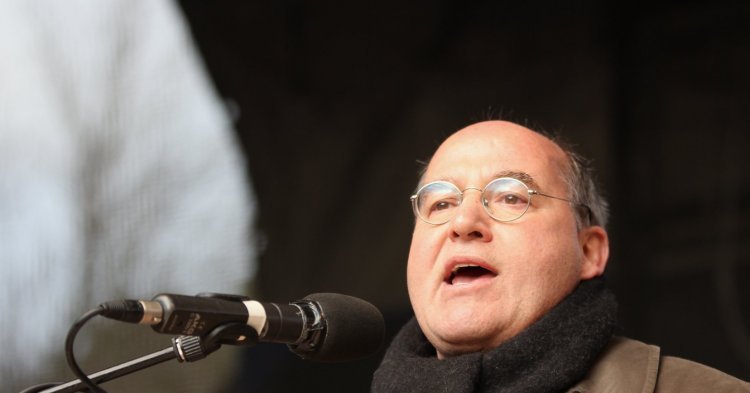Thenewfederalist.eu: Dr. Gisy, you were voted president of the European Left on 17/12/2016. What are your concrete targets as president?
Gysi: The EU and many of the nation states of Europe are in an existential crisis. Democracy, as we know it, and the European project for civilization are under threat. I want to unify the European Left and focus it on the goal of becoming an opposing force to the development of the political right in Europe, so that we may stop it and reverse it. We should also pursue a different, yet European, integration.
TNF: What will 2018 hold in store for Europe?
Gysi: This year will decide whether Brexit is performed in a fashion that it may not become the starting point for the disintegration of the Union. There is a fundamental question as to how the community can handle members, such as, for instance, Poland or Hungary, that are disbanding the rule of law and freedom of expression. The EU must show if it is able to find solutions on the international stage that do not involve military action and whether it can create communal structures for this purpose. But there are two closely linked challenges that loom over everything: On the one hand, there are social issues, and, on the other hand, there is the development of a nationalist right.
TNF: How can the EU adapt to meet these challenges?
Gysi: The European Union must be set straight. The austerity policy in recent years has led to Europe being seen as a spectre, especially in the south of Europe. The government of Germany has contributed greatly to this image without solving the debt issue. Portugal liberated itself from the policies of austerity under the guidance of a social democratic government tolerated by the Left and has managed to implement a self-sufficient economic upturn, so that it can repay its debts without having to cut pensions, wages, and benefits. The European idea of living together peacefully in social welfare and with economic development is too important to let it be destroyed by Merkel and co. That is why we need common standards in social issues, taxes, environmental policies. We need less bureaucracy, more transparency, and opportunities for democratic participation.
TNF: How can these challenges create values in Europe? Presumably not the challenges themselves, but their solutions. Basically, this is about finding back to the European idea – that peoples create beneficial development in peace and social welfare. If the challenges are met with this idea in mind, then Europe can gain value in the minds of the people again.
Gysi: By having to navigate the entirety of these crises and challenges, the EU is being strained to the extreme. But it must overcome one central issue, especially: It must not fall into a shock-induced paralysis in spite, and, in fact, because of the election super year 2019 and the Brexit negotiations. What does the EU need to do to prevent paralysis? It has become clear that the Union has no future as a mere economic union subject to neoliberal premises.
TNF: One of the charges laid against the EU is that of stark overregulation that accompanied by a loss of national identities. How do you engage with people who tell you “Brussels is dictating everything”?
Gysi: This argument hides the fact that the important decisions are made by the heads of states of the member states. Often, national governments use the EU, when they are unable to push through certain plans, such as cutting social spending, in their own countries. The EU bureaucracy has certainly developed independence and, like every bureaucracy, it has the tendency to legitimise itself through a plethora of regulations. This is why it is so important that decisions in the Union must be made more democratic. This means that the European Parliament must be given greater influence and that citizens must be allowed to decide far more by themselves and directly. Then plans, such as the privatisation of water supply with its predictably disastrous consequences, would stand no chance from the beginning.
TNF: The Turkish government is attempting to repair broken glass. First, President Erdogan praised his European colleagues as “old friends” after having compared them to Nazis only months before. Now he visited the French president Emmanuel Macron in Paris. The following day the Turkish foreign minister Cavusoglu received his German counterpart Sigmar Gabriel in his hometown of Goslar. So Cavusoglu is following Erdogan in making friendly overtures. Should this development be welcomed?
Gysi: It is always better to remain in contact. However, this should not occur at the cost of our own principles and values. For far too long, Germany and Europe have given the Turkish government allowances when it comes to human and fundamental rights in exchange for their stopping refugees on their way to Europe and being a NATO partner in a strategically important position in the Far and Middle East. The fact that it was even accepted that Turkey supported terrorist structures in proximity to the Islamic State, indirectly or directly, while the states of Europe are fighting IS, shows the moral corruption of this kind of politics. This also extends to the intrusion of Turkish troops into parts of Syria in order to fight Kurds, which runs contrary to international law.
TNF: Amnesty International accuses Turkey of torture. 2016 saw an accumulation of reports on torture and other abuses performed in police custody in the Kurdish regions of the south-east, in which a curfew was in place, and, immediately after the attempted coup, also in Ankara and Istanbul. After the declaration of a state of emergency 118 journalists were put into custody and 184 media enterprises were indiscriminately and permanently closed, thereby strongly limiting the media representation of the opposition. Is the EU putting enough pressure on Turkey to observe human rights? Is Europe doing too little?
Gysi: Soon, Deniz Yücel will have been in jail for a year. All the while European money has continued to flow into Turkey in exchange for the unacceptable refugee deal. That says everything. Deniz Naki, who was shot at in Germany, was subjected to hours of police questioning regarding his pro-Kurdish views. No, Germany and Europe have been exerting far too little pressure. The current Turkish charm offensive shows that Erdogan needs Europe. This can and should be used to prevent the transformation of Turkey into an Islamic autocracy.
TNF: How can the Kurds be supported in their struggle against oppression in Turkey, Iran, Iraq, and Syria? What can Germany, or Europe, do?
Gysi: The Kurdish question shows the lack of logic in the West’s political approach. On the one hand, the US is supporting YPG-soldiers in their fight against IS and Germany is training Peshmerga fighters and provides weaponry. On the other hand, the NATO partner Turkey, who is actively fighting the YPG and imprisons elected Kurdish HDP representatives, is provided with arms. The Kurdish people are the biggest group of people without their own state or state territory.Clearly, this can only exist, if the states, in which the Kurds now live, agree to a secession of some regions. The Iraqi reaction to the referendum in northern Kurdistan has shown, again, that we cannot expect that to happen, even though it would be the most sustainable solution for Iran, Iraq, Syria, and Turkey themselves in the long run. So, Europe should use its diplomatic weight at least to ensure minority protection and provisions of autonomous self-government.
TNF: What are your views on the Ukraine crisis and the conflict between the EU and Russia?
Gysi: In this conflict, the EU has never acted according to its interests, but rather has allowed itself to be made to serve US attempts to manoeuvre Russia into a geo-strategically disadvantageous position. The Russian reaction of annexing Crimea and supporting separatist forces in eastern Ukraine run contrary to international law. The fact that this was followed by the deployment of troops in the Baltics close to the Russian border – with the participation of German soldiers, which is historically more than disastrous – and that we have been engaged in a spiral of reciprocal sanctions does not improve the situation. Europe must define its own interests, at last, and act accordingly. Safety in Europe will not be obtained without, and, even less so against, Russia.
TNF: What has to be done?
Gysi: Europe has to take initiative for negotiations at the highest levels and should send accordingly should send a signal by reducing the sanctions against Russia.
TNF: North Korea: The London strategy institute IISS regards the regional powers as the best-suited mediators for the conflict with North Korea. The aggressive rhetoric of the president of the US will not change Pyongyang’s conduct. Many EU representatives think Europe should stay out of it. But would Europe stand a good chance of making a difference?
Gysi: The fact that Europe is not directly involved in the Korean conflict is the very reason that it could be an important mediator. The current delicate attempts and easing the tensions between North and South in the run up to the Olympics may provide an opportunity to step away from the nuclear sabre-rattling and to make some substantial steps.
TNF: In 2015 Iran agreed to international supervision of its nuclear program. The agreement is seen as a milestone for the relations between Iran and the West. President Trump has threatened to step away from the deal in its current form. Can the EU maintain the deal, if the US decides to drop out of it?
Gysi: At least in this question, there seems to be a will in Europe not to allow the US to dictate how to shape its international relations. Trump’s strategy of extreme national egoism automatically leads to a further weakening of international law, the implementation the rule of the strongest, and the military resolution of conflicts of interest. Europe must not go down this path.
TNF: Newspapers often call the younger generation a lost generation – distant from Europe and disenchanted with politics. Do you agree?
Gysi: Not at all. When I see how many young people have become engaged locally in the course of the discussion of the refugee crisis, when I experience how many young people have become involved with the Pulse of Europe movement, experience Europe by means of exchanges, then I am presented with a completely different picture. My party has had 6000 new members in the last year that were younger than 35. This is unprecedented.
TNF: Why did you want to become a politician?
Gysi: When I was asked, in December 1989, whether I wanted to become chairman of the SED, there would probably not have been any other person on Earth that would have taken on this post. In light of the hostilities, the hatred, that I faced especially during the fast half of the 90s in East and West, today, I would say no. But, if I am to take on a task, I want to do it properly. I have now been in politics for 28 years, with a three-year break in between. The fact that I could contribute to the creation of a now accepted political force to the left of the social democrats, that now even provides one of the state premiers, shows me that my work has made an impact.
TNF: Where do you see Europe in ten years?
Gysi: Difficult Question. I am not sure that Europe and its member states really understand that there is an urgent need for reforms and that national lone-wolf approaches will not help. I hope that we manage to make the EU more social, more democratic, more peaceful, more ecologically sustainable, less bureaucratic, more transparent, and less militaristic.
TNF: One last question: What advice would you like to give to our young readers?
Gysi: Become more rebellious and make Europe your issue!


Follow the comments: |
|
